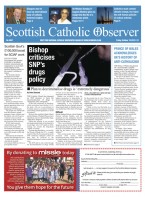BY Martin Dunlop | July 1 2011 | ![]() 1 COMMENT
1 COMMENT ![]() print
print

In defence of our schools
Publication Date: 2011-07-01
Church criticises Conservative MSP for claiming faith education fuels sectarianism
The Scottish Church this week rallied to defend Catholic education after a Conservative MSP claimed denominational education fuelled the problem of sectarianism in Scotland.
At last Thursday’s Holyrood debate on the Offensive Behaviour at Football and Threatening Communications Bill, John Lamont, the Conservative Party’s justice spokesman in Scotland, accused the education system in the west of Scotland of overseeing ‘state-sponsored conditioning of sectarian attitudes.’
Offensive
Bishop Joseph Devine of Motherwell, the president of the Catholic Education Commission, said ‘the claim that Catholic schools are the cause of sectarianism is offensive and untenable.’
“There has never been any evidence produced by those hostile to Catholicism to support such a malicious misrepresentation,” the bishop said. He added that Mr Lamont should ‘either produce the hard evidence to support such irresponsible claims or withdraw them.’
The bishop noted that ‘40 million students are taught in Catholic schools in the UK, Europe, Australia, New Zealand, Canada and the US.’
“If Catholic schools do breed sectarianism, why is there no sectarian problem in all of these other countries around the world?” Bishop Devine said. “The blunt truth is that it is the sectarianism that already exists in Scotland that fuels the continuous attack on Catholic education in Scotland.”
As MSPs debated legislation last Thursday aimed at tackling sectarian-related behaviour at football matches and online, Mr Lamont said: “The reality is that young men who are at these football matches are acting in a way that is a result of the conditioning that is started at a very early age. I would argue that certain parts of society, admittedly small, in west Scotland have promoted the culture, including partly through our education system. This segregation of our young people has brought them up to believe that the two communities should be kept separate.”
Calls to resign
First Minister Alex Salmond said that Mr Lamont should either withdraw the comments or quit as his party’s justice spokesman.
Michael McGrath, director of the Scottish Catholic Education Service, added that he hopes that Mr Lamont ‘has now come to realise the offensiveness of his comments on Catholic education.’
“His remarks not only showed a total ignorance of Catholic education, but they betrayed a crass understanding of the problems of sectarianism in Scotland,” Mr McGrath said. “We expect our politicians to display qualities of wisdom, maturity, sensitivity and respect. Mr Lamont’s comments suggest a lack of these qualities and more. It is mystifying that, despite criticisms from other political parties about his comments, the Scottish Conservative Party is not prepared to demand his resignation from his post as a party spokesperson.”
Murdo Fraser, deputy leader of the Scottish Conservative Party, said, however, that Mr Lamont’s remarks were made in a personal capacity and did not reflect party policy. “John was making these comments in a personal capacity speaking from personal experience,” Mr Fraser said. “He supports the Conservative Party’s view, which supports the right of parents to choose Catholic education for their children.”
Further condemnation
Mr Lamont’s comments were, however, further condemned by Bishop Philip Tartaglia, the president of the Scottish Bishops’ Communications Commission, who, writing in a Sunday newspaper, said that ‘in Scotland in 2011 a chillingly similar sentiment is being expressed’ to the ‘it’s your fault for being different’ view of the racist white majority in the US during the 1920s and 1930s.
“In short, Catholics are accused of being the authors of their own destruction via an atavistic compulsion to have their children educated in accordance with their faith,” Bishop Tartaglia said. “In so doing they sever the otherwise harmonious fabric of Scottish society and introduce separation and difference where none existed. Such nonsense does beg a few questions. What’s wrong with difference? Since anti-Catholicism long predates the existence of Catholic schools surely it can’t logically have been caused by them?
“When will Scottish society get past the mentality which considers any presence of Catholic Faith in the public domain as a provocation?” the bishop added. “This is the anti-Catholic sentiment which is the real sectarian cancer in Scotland.”
Defence
Further defence of Catholic schools in Scotland was made by Charles McCluskey, provincial grand knight of the Knights of St Columba in Glasgow, who said the knights were ‘astonished’ at the statements made by Mr Lamont.
“We are also seriously concerned that leading figures in the Conservative Party in Scotland do not seem to be distancing themselves from the remarks made by a senior spokesperson,” Mr McCluskey said. “There is no evidence to associate sectarianism and Catholic education and uninformed and reckless statements like this by politicians do great harm to the cause of religious harmony and unity. Catholic schools in Scotland are a success story and as such should be praised not derided.”
The introduction of the Offensive Behaviour at Football and Threatening Communications Bill has now been delayed by six months after concerns had been raised about the pace of change. The Catholic Church had last week urged the government to proceed with caution as they sought to bring in new legislation for those found guilty of abusive or sectarian behaviour at football ahead of the new season beginning next month.











Martin Dunlop in his article quoted Bishop Devine’s observation that ‘40 million students are taught in Catholic schools in the UK, Europe, Australia, New Zealand, Canada and the US.’ He also quoted Bishop Devine’s own logical corollary , “If Catholic schools do breed sectarianism, why is there no sectarian problem in all of these other countries around the world?”
This is the question the anti-Catholic schools campaigners always fail to answer. It is the question they would rather not even entertain. This is because they know the answer – that it is not denominational schools which promote bigotry but something unique to Scottish society.
Incidentally, much larger numbers attend Catholic schools in England than in Scotland yet the English experience little or no sectarian rancour. I wonder why.